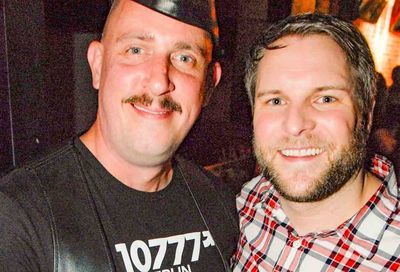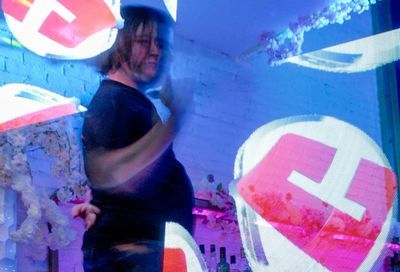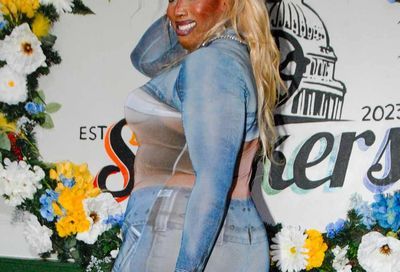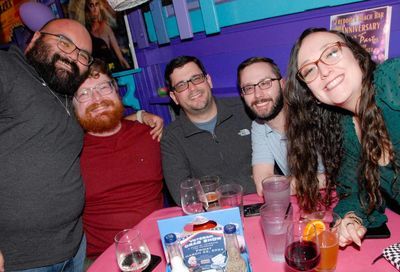Pioneer Days
Rainbow History Project names new group of Community Pioneers
The Rainbow History Project, a local organization formed in 2000 to preserve and promote the history and culture of the D.C. area’s LGBT community, earlier this month announced RHP’s 2012 ”Community Pioneers,” who will be honored at an Oct. 4 reception.
”These tenacious and creative individuals are being recognized for their instrumental roles creating and sustaining the DC LGBT community’s most important institutions,” RHP offered in a statement announcing the reception, the third such event celebrating the pioneers, whom RHP has been naming since 2007. ”The event provides an opportunity for the community to say thank you.”
Nine new pioneers are expected to attend the upcoming reception. They are:
Colevia Carter, an activist, musician and poet. Carter’s written words have appeared in publications such BlackLight and Lesbian Culture, while her activism found its voice in groups such as the Lesbian Feminist Network and the Langston Hughes-Eleanor Roosevelt Democratic Club, which she helped found. Carter also served as the first out lesbian commissioner on the D.C. Human Rights Commission.
Keith Clark, an entrepreneur who now lives in Florida, started the Universal Gear clothing store. His involvement in the community is, however, much deeper than apparel. Clark was a co-founder of One in Ten, giving D.C. its annual LGBT Film Festival. One in Ten also took the reins of the annual Capital Pride festival from some years in the 1990s.
Paulette Goodman is a cross-cultural inspiration, not only having survived the Holocaust as a Jewish girl living under the Nazis in occupied Paris, but later, with a lesbian daughter, helping to found the metro-D.C. chapter of Parents, Family and Friends of Lesbians and Gays (PFLAG). From 1988 to 1992, Goodman served as PFLAG’s national president.
José Gutierrez, as a young Mexican immigrant living in Atlanta and working HIV/AIDS education, first came to Washington in 1993 for the March on Washington for Lesbian, Gay and Bi Equal Rights and Liberation. By 1994, D.C. was home, and Gutierrez became a strong member of his new community, founding the city’s Latino GLBT History Project, among a variety of other involvements.
Susan Hester, transformed the pain of losing her partner, Mary-Helen Mautner, into honoring Mautner’s wish that she create an organization to help other lesbians facing life-threatening illness. Hester turned that wish into the Mautner Project: The National Lesbian Health Organization, based here in Washington.
Len Hirsch came to D.C. in 1985 to be with his partner, Kristian Fauchald, whom he married in 2008. As a Washingtonian, it’s no surprise Hirsch ended up working for the federal government. He went far beyond the call of duty, however, organizing the first meeting of LGBT federal employees, with became Federal GLOBE (Gay, Lesbian, Bisexual and Transgender Employees of the Federal Government). Today he serves as the group’s president.
Robert Miailovich, a San Francisco native, moved to D.C. for work in 1975, where he learned of Dignity/Washington, an LGBT-affirming organization for Catholics and other Christians. Beyond the local chapter, Miailovich eventually became president of Dignity/USA, while also finding time for other local organizations, such as the Northern Virginia AIDS Ministry and D.C.’s Different Drummers.
Bob Summersgill has been long entrenched in D.C. politics, both as an officer and member of the Gay and Lesbian Activists Alliance of Washington, D.C. (GLAA), helping to craft and secure laws securing greater equality for LGBT Washingtonians. Today he’s also an elected Advisory Neighborhood Commission member.
Jessica Xavier, a native Washingtonian, founded the D.C. chapter of Transgender Nation in 1995, as well as led protests in the wake of the 1995 death of Tyra Hunter, a transgender woman refused care by emergency personnel following a car accident. Xavier also helped secure gender-identity protections in Maryland.
One of the pioneers not expected at the Oct. 4 reception is Robert Alfandre, who will be out of the country. His contributions, however, remain in Washington wherever he may go. Having amassed substantial wealth as a homebuilder in Maryland, Alfandre shared his good fortune in some of D.C.’s darkest days, raising millions of dollars for Whitman-Walker Clinic (now Whitman-Walker Health).
RHP will also be honoring four others, posthumously, at the reception. They are James Mercer of Black and White Men Together (BWMT), whose fight against discriminatory carding policies at nightlife venues became the Alcoholic Beverage Antidiscrimination Act; Larry Uhrig, elected pastor of D.C. Metropolitan Community Church in 1977, played an important role in the church eventually securing a permanent home; Stefan Wade, who helped build the foundations that enabled the Sexual Minority Youth Assistance League (SMYAL) to grow from humble 1984 beginnings to the thriving organization it is today; and Cade Ware, whose activism went from the streets to schools, from police entrapment to ”Someone In Your Life Is Gay” public service announcements.
These names will be added to a list of individuals who have built the local LGBT community, a list of nearly 70 names, says Chuck Goldfarb, RHP board chair. It’s recognition that not only honors those named, he says, but that helps the community define itself.
”I want to make sure there’s information out there about how things got started. There are things to learn from, how people provided different leadership skills to new organizations,” Goldfarb says. ”If we’re not out there defining our community and history, there’s always a danger of someone else defining it for us.”
The Community Pioneers Reception is Thursday, Oct. 4, from 6:30 to 8:30 p.m., at the Thurgood Marshall Center, 1816 12th St. NW. Admission is free, donations welcome. For more information about the reception, the Rainbow History Project or the Community Pioneers, visit rainbowhistory.org.
Support Metro Weekly’s Journalism
These are challenging times for news organizations. And yet it’s crucial we stay active and provide vital resources and information to both our local readers and the world. So won’t you please take a moment and consider supporting Metro Weekly with a membership? For as little as $5 a month, you can help ensure Metro Weekly magazine and MetroWeekly.com remain free, viable resources as we provide the best, most diverse, culturally-resonant LGBTQ coverage in both the D.C. region and around the world. Memberships come with exclusive perks and discounts, your own personal digital delivery of each week’s magazine (and an archive), access to our Member's Lounge when it launches this fall, and exclusive members-only items like Metro Weekly Membership Mugs and Tote Bags! Check out all our membership levels here and please join us today!





















